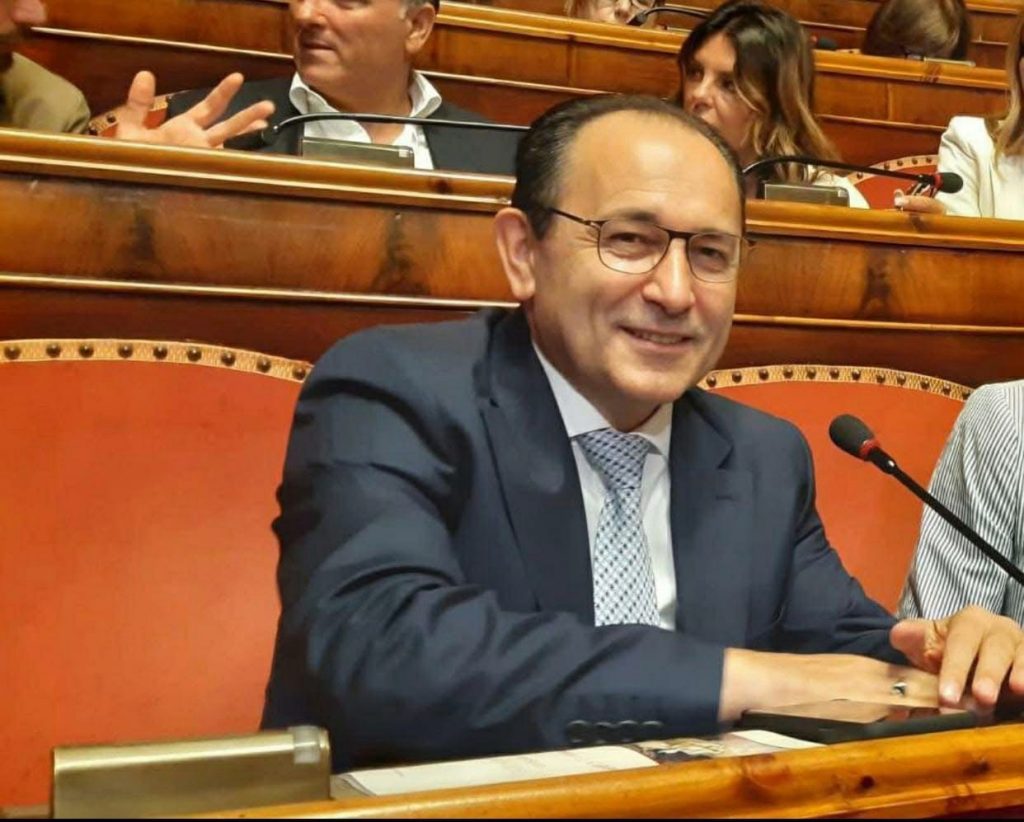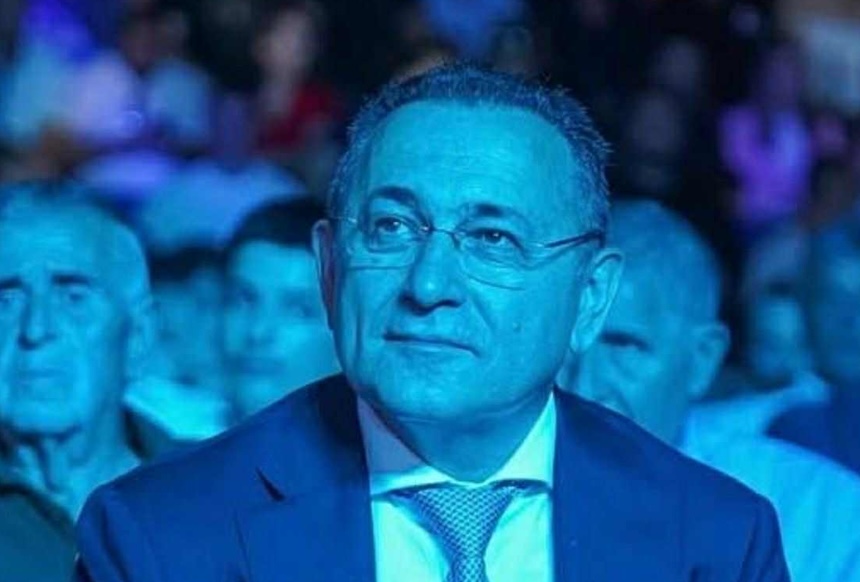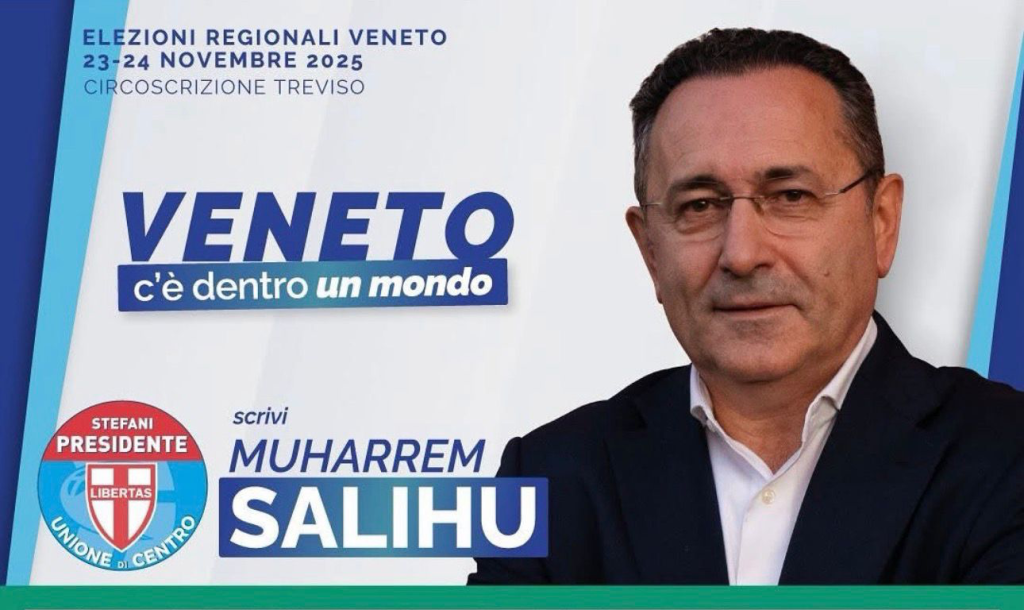By Balkan View
Ethnic Albanian community activist and businessman Balkans, Muharrem Salihu, is a candidate in Italy’s regional elections scheduled for Nov. 23.
Salihu, who has lived and worked for decades in Venice, will run in the key provinces of Venice and Treviso, where he has been active in supporting the Albanian community and promoting local development.
Backed by local Albanian networks and supporters, Salihu aims to influence regional decision-making and advocate for the needs of Albanians and other residents living and working in the area.
As an Albanian-born entrepreneur who has spent 32 years building a business career in Italy, he is running for a seat in the Veneto Regional Council with a platform centred on housing, economic development and migrant integration.
Salihu says his decision to enter politics stems from the belief that “individual success is no longer enough without political representation” for migrant communities that have worked, invested and integrated across the region.
“Albanians and other communities have created jobs and earned respect, but our voices are still not heard where decisions are made,” he told Balkan View. “That is why I chose to run — to represent with honesty, integrity and responsibility, and to bring forward the values that unite us: dignity, work, family and solidarity.”
Positioning Himself as a Bridge
Salihu, who has employed and integrated thousands of Albanians through his businesses, describes himself as a bridge between communities.
“I have worked closely with Italian institutions, local businesses and the wider community. Real integration is built on respect and shared responsibility,” he said. If elected, he says his priority would be to represent “the common interest of all citizens, regardless of origin.”
His campaign points to two core commitments: supporting the Albanian community on issues of documentation, employment and representation, and contributing “as a citizen who has chosen Italy as the place to build his life and work.”
Salihu’s programme places housing at the top of the agenda. He cites more than 10,000 families awaiting accommodation while nearly 7,800 units across the region remain abandoned.
His proposals include:
- returning empty homes to the rental market at affordable rates,
- prioritising urban regeneration over new construction,
- establishing a Regional Guarantee Fund for young people, workers and families seeking dignified housing.
Beyond housing, he calls for support to youth startups, incentives for companies employing young people and women, aid to small businesses and artisans, and stronger oversight of working conditions in agriculture and construction.
His other priorities include childcare support for working mothers, scholarships for children, improved public transport, and simplified digital public services. He also emphasises social welfare measures ranging from psychological support to more transparent and citizen-friendly municipal offices, as well as cleaner, safer cities with expanded green areas.
‘Mutual Benefit’ for Migrants and Locals

Salihu argues that political representation for migrants should be framed as a shared benefit.
“Albanians have built success stories through work and dedication. Now economic success must translate into political representation,” he said. He highlights free language and professional training courses, support for families facing housing and employment challenges, and the promotion of Albanian and Mediterranean culture.
“This is a mutual benefit: real integration for foreign communities and balanced development for local residents.”
He identifies labour market integration — especially for youth and women — as a persistent challenge for migrant families, citing housing shortages, complex bureaucracy and inaccessible services.
“No one should be left behind,” he said. His proposals include boosting social services, supporting small businesses and artisans, improving safety standards in key sectors and enabling Albanian-language learning options within public schools.
Working With Municipal Governments
Salihu says his approach is rooted in cooperation rather than confrontation.
“Politics is not conflict — it is service,” he said. He plans to create working groups with mayors, associations and economic actors “for every project that affects citizens.”
He has pledged to publish periodic activity reports, maintain open consultations with citizens and support audits of all public funds under his mandate.
“Transparency is not a promise — it is a working standard,” he said, adding that he will publicly disclose the sources and spending of his campaign. “Trust is built on clarity and responsibility.”
Experience in a Decentralised Region
He argues that Veneto needs “strong entrepreneurial experience, knowledge of migration dynamics and the ability to unite diverse communities.” His contribution, he says, will be “practical, direct and rooted in real work and results.”
Salihu says tensions can be reduced through communication and shared initiatives. He notes that migrants contribute more than €10 billion annually to Italy’s economy and that Albanians have opened over 23,000 businesses in construction — a sector affected by a rapidly ageing workforce.
“Ties are strengthened through institutional dialogue, cultural and educational projects, citizen participation and cooperation with schools and municipalities,” he said. “We are a bridge between cultures — and that bridge must be strengthened.”
Appeal to Skeptical Voters
To those undecided, he offers a direct message: “Do not let others decide in your place. If you don’t vote, others will decide for your life. It is time to work for housing, employment, family and well-being — and everything begins with one vote.”




